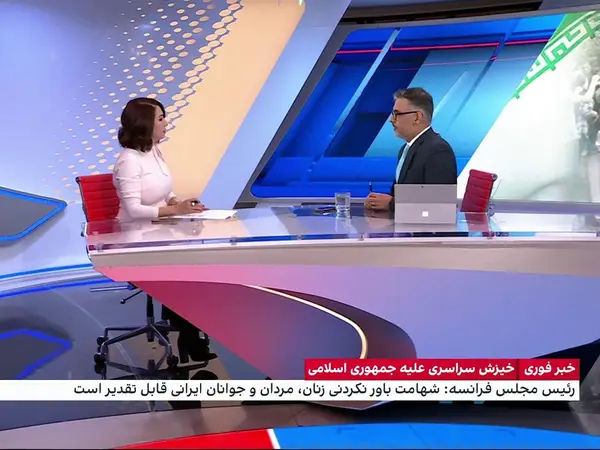A senior Iranian lawmaker has asked the government to pursue legal complaints against Iran International TV for its coverage of protests that “invited riots.”
Mohammad-Taghi Naghdali (Naqdali) the secretary of Islamic Republic parliament’s legal and judicial committee, and a hardliner cleric, called on the government and the foreign ministry, October 8, to “use capabilities in the international arena” to take steps against Iran International and similar networks that “make calls for riots, destruction of property and regime change.”
Tens of millions of Iranians rely on social media and satellite TV channels to receive news and information that Iranian government-controlled media deny them. Iran International, BBC Persian, Manoto TV and US financed media beam programs to Iran that provide news, which is censored in local media by the government and its intelligence organs.
As protests began in Iran in mid-September, authorities severely restricted Internet and social media access, leaving the population to rely more on foreign-based television stations for news and information.
The Iranian government has tightly controlled media for over four decades, shutting down hundreds of newspapers and has jailing around 860 journalists over the years.
The Iranian government has been putting pressure on foreign-based Persian speaking media organizations for over a decade. First, websites of Radio Farda, BBC Persian and Voice of America were blocked in early 2003, before Iran International was established. Both radio and TV signals have been jammed and any contact with these media outlets have been punishable by lengthy prison terms.
In 2020, the Iranian judiciary announced confiscation of the properties of those journalists who had left the country and were working for Iran International.
In 2019, Iran’s ambassador in the United Kingdom had lodged a complaint to the British media watchdog Ofcom against the network which is based in London.
In March 2019, Ofcom dismissed the complaint, which related to a specific interview, saying that the network adhered to its guidelines.
At the time, Iran International representatives told the Guardian that the channel “provides fair, balanced and impartial coverage, and abides by its published Editorial Guidelines”, adding that it “covers the widest range of opinions of interest to all Iranians and Farsi speakers”.
However, Tehran continued its attacks against Iran International. In a statement released in November 2019, Iran's Intelligence Ministry said working for the network was "proof of collaboration in terrorist actions with the enemies of Iran" and claimed that it has arrested a number of individuals on charges of sending information to Iran International.
In his attack on the network, the Iranian lawmaker Naghdali specifically mentioned Ofcom, asking the government to take advantage of the watchdog’s existence, which he said “can be used by the foreign ministry and the Judiciary” to go after Iran International.
Iran International dismissed the claims of Mohammad-Taghi Naghdali on Sunday, saying that it adheres to OFCOM broadcasting guidelines. The network said its news coverage provides a platform to Iranian commentators, human rights defenders and civic activists to discuss vital social and political issues.
“Sadly, freedom of the press is denied to Iranian citizens in Iran. They are denied their voice by the Iranian government’s tightly controlled media,” the network's General Manager Mahmood Enayat said.
